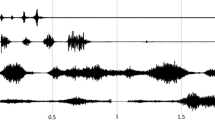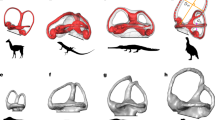Abstract
THE current view is that ventilation of the lungs by aspiratory, negative-pressure inhalation probably occurred in the earliest, now extinct amphibians1. But no aspiration breathing has been demonstrated in extant air-breathing vertebrates below reptiles, which use freely movable ribs and specialised muscles for this purpose. We report experiments showing that the aestivating lungfish relies on suctional breathing.
This is a preview of subscription content, access via your institution
Access options
Subscribe to this journal
Receive 51 print issues and online access
$199.00 per year
only $3.90 per issue
Buy this article
- Purchase on Springer Link
- Instant access to full article PDF
Prices may be subject to local taxes which are calculated during checkout
Similar content being viewed by others
References
Gans, C., Evolution, 24, 723 (1970).
MacMahon, B. R., J. exp. Biol., 51, 407 (1969).
Johnels, A. G., and Svensson, G. S. O., Ark. Zool., 7 (7), 131 (1954).
Smith, H. W., Ecology, 12, 164 (1931).
Jesse, M. T., Shub, C., and Fishman, A. P., Resp. Physiol., 3, 267 (1967).
Author information
Authors and Affiliations
Rights and permissions
About this article
Cite this article
LOMHOLT, J., JOHANSEN, K. & MALOIY, G. Is the aestivating lungfish the first vertebrate with suctional breathing?. Nature 257, 787–788 (1975). https://doi.org/10.1038/257787a0
Received:
Accepted:
Issue Date:
DOI: https://doi.org/10.1038/257787a0
This article is cited by
-
The morphology of the lung of the African lungfish, Protopterus aethiopicus
Cell and Tissue Research (1987)
Comments
By submitting a comment you agree to abide by our Terms and Community Guidelines. If you find something abusive or that does not comply with our terms or guidelines please flag it as inappropriate.



